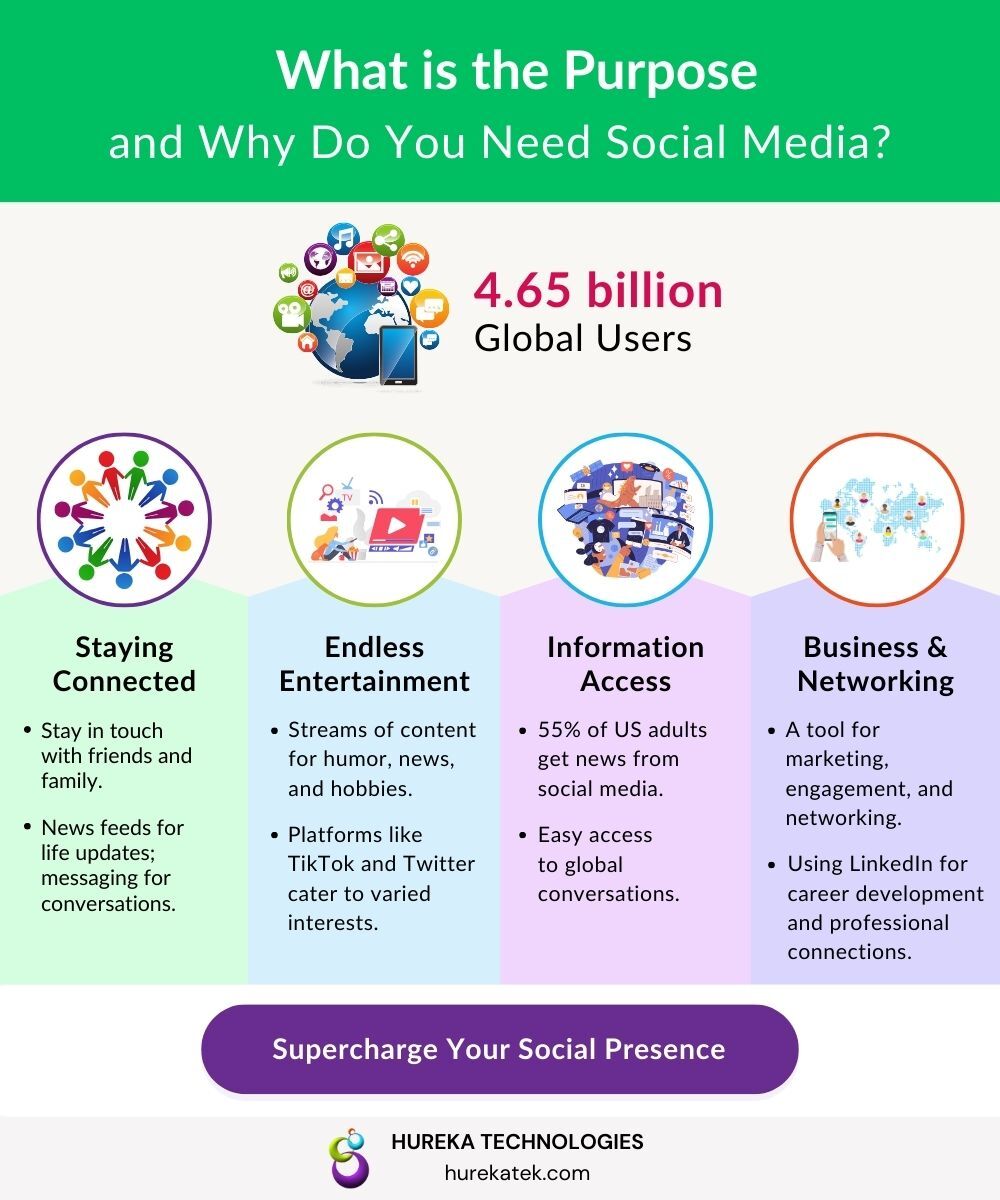Social media has become an integral part of modern society, transforming the way people communicate and share information online. The evolution of social media from basic messaging platforms to complex social networks underscores its growing importance in contemporary culture.
While early internet messaging services like AOL Instant Messenger and IRC channels allowed real-time communication between individuals, the launch of SixDegrees.com in 1997 is considered the first true social networking site. SixDegrees enabled users to create profiles and connect with friends, providing a glimpse into the social media experience we know today.
W dzisiejszych czasach korzystanie z kasyn internetowych stało się niezwykle popularne. Z jednej strony stanowią one doskonałe źródło rozrywki, z drugiej zaś mogą przynieść spore zyski. Dlatego też tak ważne jest wybranie wypłacalnego kasyna internetowego. W tym artykule postaramy się przekazać przydatne wskazówki, które pozwolą Ci na znalezienie najlepszych kasyn internetowych - pl.kasynopolska10.com/najlepiej-wyplacalne. Po pierwsze, warto zwrócić uwagę na stopień wypłacalności kasyna internetowego. Dobrze jest przeczytać opinie innych graczy oraz sprawdzić informacje na temat firmy, która prowadzi dane kasyno.
W internecie znajdziesz wiele portali, które publikują rankingi kasyn internetowych, w których uwzględnione są takie kryteria jak wypłacalność czy dostępne metody płatności. Warto z nich korzystać, gdyż pozwolą na uniknięcie kasyn, które są niewypłacalne. Kolejnym krokiem jest zwrócenie uwagi na dostępne metody płatności. Dobrze jest wybierać kasyna, które oferują szeroką gamę metod płatności, co pozwoli na wygodne wpłacanie i wypłacanie pieniędzy. Warto też zwrócić uwagę na to, czy kasyna oferują bezpieczne transakcje, na przykład poprzez szyfrowanie SSL. Kolejna ważna kwestia to dostępność gier. Warto wybierać kasyna, które posiadają bogaty wybór gier, takich jak automaty, ruletka czy blackjack.
Dobrze jest też zwrócić uwagę na to, czy kasyna oferują gry na żywo z krupierami, co pozwala na uzyskanie większej adrenaliny i poczucia gry w rzeczywistym kasynie. Warto też zwrócić uwagę na bonusy oferowane przez kasyna. Większość kasyn przyznaje bonusy powitalne, dzięki którym gracze mogą zdobyć dodatkowe pieniądze na grę. Dobrze jest zwrócić uwagę na wymagania dotyczące obrotu bonusów oraz ich wartość, gdyż nie warto polegać wyłącznie na bonusach. Ostatnim ważnym czynnikiem jest obsługa klienta. Kasyna powinny oferować fachową i szybką pomoc w przypadku problemów związanych z korzystaniem z platformy. Warto zwrócić uwagę na dostępność różnych form pomocy, takich jak czat na żywo czy mail.
Over the next decade, social networking sites like Friendster, MySpace and Facebook began competing for users' attention and reshaping online interactions. Facebook's emergence in the mid-2000s marked a shift toward multifaceted social media platforms that incorporated status updates, photo/video sharing, public commentary, private messaging, and other innovative features.
The widespread adoption of smartphones further accelerated social media's popularity and functionality. Apps like Instagram and Snapchat demonstrated the potential of mobile photo and video sharing, while Twitter introduced a new model of real-time status broadcasting to the masses.
Modern social networks now serve critical social, cultural, political, and economic functions for billions of users worldwide. Understanding social media's origins and evolution is key to recognizing its profound importance in contemporary society across domains ranging from interpersonal communication to celebrity influence, community building to social activism.
As social media continues to evolve in form and purpose, our interpretations of these powerful platforms - both their benefits and challenges - must evolve as well.
What is Social Media?
PayID has become increasingly popular in Australian online casinos due to its innovative approach to simplifying online transactions. This payment system stands out for its ease of use, allowing players to make deposits and withdrawals using a simple identifier like an email address or a phone number. This convenience eliminates the need to remember and enter complex bank account details, streamlining the payment process significantly. For players looking to use PayID, finding online casinos that accept this payment method and cater to Australian players is made easy with https://casinoau10.com/payid/. The site provides a list of reputable online casinos where PayID is accepted, ensuring a hassle-free gaming experience. Another key reason for PayID's popularity is the security it offers. Transactions do not require the disclosure of sensitive banking information, reducing the risk of financial fraud. This added layer of security is particularly appealing to players concerned about the safety of their online transactions. Furthermore, PayID transactions are known for their speed. Unlike traditional bank transfers that can take several days, PayID payments are processed almost instantly..
Social media refers to internet-based applications and websites that allow users to interact, create and share content, and participate in networks and communities. The key defining feature of social media is user-generated content that engages audiences online.
While the term "social media" refers to a broad range of platforms and services, some common examples include social networking sites like Facebook, Instagram, and LinkedIn, microblogging sites like Twitter (X) and Tumblr, media sharing sites like YouTube and TikTok, review sites like Yelp and TripAdvisor, and many more.
At its core, social media allows people to connect and communicate with each other across the internet. This serves many different purposes, which is why the question "what is social media used for?" has varied answers. People use social media to stay in touch with friends and family, make new connections, share opinions and experiences, distribute news and information, promote businesses and organizations, find entertainment, and more.
Social media facilitates many-to-many communication, meaning users can interact with broad audiences beyond just one-to-one messaging. Platforms are designed to enable sharing, engagement and participation, with features like comment sections, hashtags, @ mentions and algorithmic news feeds. This turns media consumers into media creators.
While social media is sometimes dismissed as superficial or distracting, it has evolved into a versatile tool integrated into all aspects of society and culture. It serves functions far beyond just social networking and entertainment. Social media allows civic participation, activism, awareness campaigns, and more. It has even influenced politics, business operations, and how we communicate.
Understanding social media requires looking beyond status updates and selfies. It is a medium for communication, a tool for organizations, a stage for entertainment, a marketplace for commerce, and a forum for public discourse. Recognizing the breadth of its impact and possibilities is key to navigating the social media landscape.
What is the Purpose and Why Do You Need Social Media?

Social media is deeply ingrained in modern society, as evidenced by statistics on its widespread adoption and use. As of 2022, nearly 4.65 billion people around the world now use social media, representing more than 58% of the global population (Source: DataReportal). In the US alone, over 70% of the population uses social networking sites.
What drives people to social media and makes it such an integral part of daily life for so many? There are several key reasons and motivations behind social media usage:
- Connecting with Friends and Family: Social platforms make it easy to stay in touch and communicate with friends, family members, and acquaintances. Features like news feeds provide updates into the lives of connections, while messaging allows direct conversations. During the COVID-19 pandemic, many relied on social media to maintain relationships while physical interactions were limited.
- Entertainment: Social media offers an endless stream of content for information and entertainment. Users can get laughs from funny videos on TikTok, catch up on current events via news shared on Twitter, or find accounts related to their hobbies and interests. Social media offers something engaging for everyone.
- Accessing News and Information: An increasing number of people now get their news primarily through social media instead of traditional outlets. Pew Research found that 55% of US adults regularly get news from social media. Platforms make global conversations accessible.
- Business and Networking: Businesses big and small leverage social media for marketing, customer engagement, networking, recruitment, and more. Sites like LinkedIn exist specifically for professional connections and career development. Even individuals can build their personal brands.
For better or worse, social media has become ingrained into the fabric of society. Understanding the drivers behind its usage can help illuminate why it remains so popular and important in everyday life.
Importance of Social Media for Businesses

Adopting social media strategies has become mandatory for success in the digital era. Statistics clearly demonstrate social media's business impact:
- 72% of customers say positive social interactions make them more likely to recommend a brand. Source: Sprout Social.
- 60% of users are more likely to shop from brands they engage with on social media. Source: Social Media Today.
- Brands that engage on social media grow revenues 4x faster than those that don't. Source: AdWeek.
- 72% of internet users worldwide now purchase products online after discovering them on social media. Source: GlobalWebIndex
- 55% of US adults regularly get news via social media. Source: Pew Research Center.
Social media is critical for building brand recognition and community. It provides platforms for brands to share their identities, values, content, and expertise in order to nurture meaningful customer relationships over time.
Just as importantly, social channels allow brands to listen to and engage with current and potential customers - fostering loyalty and conversions through customer service, promotions, and relevant content.
With billions of active users worldwide, social media offers an unparalleled opportunity for brands to tap into new demographics and geographic markets by tailoring ads and messaging accordingly.
By combining social media tactics with traditional marketing, brands can thrive in the digital age. Social engagement is now indispensable for business growth and staying ahead of the competition.
Social Media Cost Savings
Social media marketing has emerged as an extremely cost-effective method for businesses to reach customers compared to traditional print, TV, radio and other forms of advertising. The public nature of social platforms allows brands to target defined audiences for free simply by creating content designed for engagement.
According to research by AdEspresso, Facebook and Instagram ads have 50% lower cost per impression rates than primetime TV ads. Social platforms also enable precise audience targeting to ensure ad spend is highly optimized. A retailer can target women aged 25-35 within a certain city rather than pay for a regional TV spot seen by many non-customers.
Additional cost savings come from social media's unique forms of organic reach. For example, a company can build an engaged following on Twitter through relevant content and dialogue. Brand messages and offers are then seen by followers for free rather than paying cross-platform ad fees.
User-generated social content also provides free amplification of brands and messaging. A satisfied customer posting on Instagram about a positive product experience will authentically reach friends within the target demographic. Traditional ads cannot achieve such authentic peer-to-peer marketing impact.
Overall, the direct and viral reach enabled by social platforms removes many traditional advertising costs. Small businesses with limited marketing budgets in particular can build brand awareness and convert customers through organic and paid social media activity. Targeted ads and creative content allow any business to maximize marketing ROI.
According to Adobe, 66% of small businesses say social media marketing has allowed them to gain new customers at little-to-no cost. The accessible, expansive reach of platforms like Facebook, Instagram, LinkedIn, and Twitter levels the playing field for organizations of any size.
Search Engine Optimization (SEO) and Social Media

Social media usage and search engine optimization are deeply intertwined in modern digital marketing. While SEO focuses on improving website visibility on search engines, social media provides an important conduit for driving traffic, backlinks, and overall domain authority.
Sharing website and blog content on social platforms directly sends visitors to sites by converting followers into click-through traffic. Sites optimized for social sharing typically see substantial traffic increases. Social referrals account for more than 20% of total web traffic for many publishers.
Social platforms also boost SEO through backlink building. Links shared on sites like Facebook and Twitter allow search engines to discover new quality content. The more authoritative social sites link back to a domain, the greater its credibility in Google's eyes. Social amplification of content generates backlinks organically without dedicated link-building efforts.
Hashtags and keyword inclusion in social posts also support on-page and off-page SEO. Strategic use of relevant hashtags and keywords when sharing links helps associate authority around those terms with a brand's domain. This strengthens keyword targeting in organic search.
While high-quality content is still king, it means little without distribution. Social media sharing not only builds awareness of content, but signals to Google the authority of domains. This in turn improves search rankings and visibility.
According to Search Engine Journal, 71% of marketers say social media helps their websites gain traffic, and 55% say it improves search engine rankings. Combined together, the SEO and social media strategies create a positive feedback loop where more visibility drives more traffic, shares, backlinks, and authority for brands.
Integrating social distribution into the content creation process is now mandatory for comprehensive SEO. The synergistic strengths of social engagement and search optimization offer the ideal path to reach relevant audiences online.
The Big Picture of Social Media
While social media clearly provides advantages for brands and marketers, its impact stretches far beyond the business realm. The rise of social networking and media sharing has transformed how people communicate, get news and learn.
Social media offers unlimited access to educational materials, thought leaders, instructional videos and more for personal development and learning. It has enabled global knowledge sharing like never before. Platforms like Facebook Groups unite niche learning communities, while influencers distribute tutorials to millions.
Social media also connects people in real-time with global current events and happenings they would otherwise never experience. Live updates give window views into breaking news, cultural events, and people worldwide. This represents a monumental shift in how human beings stay informed and involved.
Just as importantly, social platforms provide arenas for self-expression, opinion sharing, and public commentary. They give everyone the ability to share thoughts, respond to others, and join important conversations. This facilitates grassroots movements, civic debate, and societal change.
While risks like misinformation and polarization exist, social media overall has enabled unprecedented empowerment and democratization. It has returned some power of mass communication back to everyday citizens.
According to Pew Research, around 70% of social media users in both the US and UK say these platforms are very or somewhat important for getting elected officials to pay attention to issues. Social media expands political and societal participation.
The social media landscape continues to evolve rapidly as these technologies are now embedded into the very fabric of human connection, expression, learning and progress.
Social Media Engagement Strategies
Effectively managing social media presence and maximizing engagement requires strategic planning and execution. Brands must implement proven tactics to cut through noisy feeds and connect meaningfully with target audiences.
- Central to success is consistency in posting and community building. Brands should establish regular content creation and sharing schedules tailored to each platform. Posting daily keeps accounts active and top of mind.
- Creating shareable visual content is also engagement-critical. Posts with images/video tend to perform 100% better than text-only posts. Tools like Canva enable easy, professional visual content creation.
- Hashtags and @mentions help expand reach and participation. Strategic hashtag use associates brands with topics, while @mentions draw influencers or company partners into the conversation.
- Paid social ads via platform tools let brands target key demographics and interests to complement organic content. Ads boost visibility and engagement.
- Monitoring branded hashtag and keyword mentions also provides opportunities for interaction.
- Responding to customer questions and feedback nurtures relationships.
- Analysis of engagement analytics identifies the highest performing content types, topics, and formats. This data should steer an always-optimizing strategy.
- Establishing engaged online communities through forums, user-generated content and conversations builds loyalty. Customers become brand ambassadors.
With billions of active social media users worldwide, establishing a thoughtful presence is no longer optional for brands. Following proven social media strategies and best practices leads to measurable business returns through reach, reputation and revenue growth.
Real-World Social Media Applications
![]()
While the benefits of social media may seem theoretical, real-world examples and case studies demonstrate tangible results for organizations and individuals.
Individuals can leverage social media for professional networking, branding, and opportunities. Fitness influencer Kayla Itsines built a global community of over 13 million followers through Instagram and Facebook. She monetized this influence into her multimillion dollar Bikini Body Training Company.
Small businesses frequently utilize social platforms to boost brand awareness and sales on a budget. Texas-based hamburger restaurant Pluckers Wing Bar gained national recognition through viral social media campaigns and TikTok videos. This social traction expanded its customer reach and franchising opportunities.
Even major corporations attribute significant value to social media. According to Unilever's VP of Media, 70% of their marketing budget is now allocated to social platforms and engagement. Social provides unparalleled audience targeting capabilities.
Nimble social media marketing can also drive major returns. mTap's digital business cards gained over 1 million views via viral TikTok videos and social buzz, demonstrating social media's ability to catapult product success.
With strategic planning, any entity can leverage these far-reaching platforms to meet key business goals or personal objectives. The diverse real-world applications and measurable ROI continue to expand across industries and demographics.
AI in Social Media
Artificial intelligence (AI) is progressively influencing various aspects of social media and how users interact on these platforms. AI enables more automated, personalized, and sophisticated experiences on social networks.
One major application is using machine learning to recommend relevant content to users based on their interests, demographics, and online behavior. AI analyzes user data to curate customized feeds and suggest new accounts or groups to follow. This creates stickier, more engaged experiences.
Chatbots and digital assistants that interact conversationally with users via messaging are also becoming more AI-powered. They can handle customer service queries, take orders, provide information, and more.
Behind the scenes, AI is leveraged to moderate harmful content and fake accounts at scale. With billions of posts daily, automated AI systems can detect policy violations much faster than human reviewers. AI also bolsters cybersecurity protections.
Influencer and celebrity deepfakes represent a concerning trend aided by AI, where their likeness is synthesized into fabricated videos. However, AI detection countermeasures help identify deepfakes.
Looking ahead, AI will allow more interactive, multimedia social experiences through AR and VR. AI-generated content may also continue disrupting authenticity, requiring vigilance from platforms.
AI has constructively enhanced social media value, engagement and safety through personalization, automation, and robust systems. It will likely expand functionality and experience as the technology progresses.
Learn about other applications of Artificial Intelligence (AI) in Digital Marketing.
Social Media Business Benefits
![]()
Businesses can derive immense value from social media when leveraged strategically. The unique opportunities and advantages include:
- Direct Audience Engagement and Feedback: Social platforms allow brands to directly interact with target demographics. This fosters loyalty through customized engagement, while enabling feedback collection.
- Enhanced Brand Popularity: Strategic social media presence leads to increased brand exposure, authority, and popularity. More online popularity associates brands with relevance and influence.
- Increased Website Traffic: Social posts and campaigns drive referral traffic to main websites by converting followers into visitors. More traffic can boost SEO and conversions.
- Partnership Opportunities: Social platforms facilitate collaborations between complementary or aligned brands to cross-promote offerings. This expands reach.
- Analytic Tools: Platforms provide built-in analytic dashboards tracking post reach, engagement, clicks, audience demographics, and more. This data informs optimal social strategies.
Social media enables key pillars of modern marketing from brand-building to conversions at affordable, measurable and continuously optimized scales. This multitude of business benefits positions social media engagement as a required component of success.
Frequently Asked Questions About Social Media
1. What is the main purpose of social media?
The main purpose of social media is to connect people and facilitate communication globally. Social platforms allow users to share information, express themselves, and interact with broad audiences in real-time. This fosters the building of relationships, communities, and networks. Social media also serves as a critical avenue for entertainment, marketing, activism and more.
2. What are the 5 uses of social media?
- Communication - Messaging, sharing updates, having conversations
- Entertainment - Watching videos, looking at images, playing games
- Marketing - Advertising, building brand awareness, generating leads
- Networking - Making professional connections, finding communities
- Education - Accessing resources, joining discussions, sharing knowledge
3. What are 3 main reasons why people use social media?
- Personal Connection - To stay in touch with friends and family
- Information Access - To get news, discoveries, and recommendations
- Entertainment - To fill leisure time, relax, and have fun
4. What are the 7 functions of social media?
- Communication
- Marketing
- Entertainment
- Education
- Networking
- Community Building
- Brand Promotion
5. What is the real point of social media?
The real point of social media is to connect billions of people together into an interactive, global community. It allows instant communication, relationship building, idea sharing, and access to information that crosses geographical boundaries.
6. Why is social media necessary?
Social media is necessary because it has transformed how people interact, do business, get news, learn and participate in society. It offers unique opportunities for marketing, networking, activism, and staying culturally connected that did not exist before.
7. How do you get started implementing your Social Media strategy?
Schedule a free consultation with us at Hureka Technologies. Our social media experts can assess your business goals and existing presence to develop a strategic social media marketing plan tailored for your brand's success.
Embrace the Purpose and Importance of Social Media
Social media has evolved to become an integral element across all aspects of society, from interpersonal connections to brand building. We have seen how social platforms empower self-expression, activism, real-time news access and global perspectives. We can all derive immense value in relationships, discourse and enrichment through mindful social media use.
Social media offers invaluable marketing, engagement and growth opportunities unmatched by traditional channels for businesses. Insightful social strategies build brands, nurture customers, boost sales, and provide competitive advantage. Organizations must embrace social media purposefully, not just chase trends. Success comes from maximizing reach while providing value and aligning with company vision.
Many brands still underutilize social media or rely on organic efforts alone. This leaves potential untapped. To excel today, companies must implement paid social ads, multimedia content, influencer partnerships and always-on listening and interaction.
Are you ready to realize social media's full potential? At Hureka Technologies, our experts live and breathe innovative social strategies scaled to your unique goals. Let us optimize your social presence and strategy.
Schedule a free consultation today to learn how our holistic solutions deliver real social media success. Join leading brands who trust Hureka to maximize the purpose and importance of social media.

